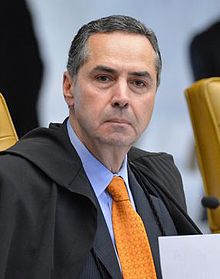|
Luís Roberto Barroso
Luís Roberto Barroso (Portuguese pronunciation: [ɫwis, ɫwiʃ ʁoˈbeɾtu baˈʁɔzu]; born 11 March 1958) is a Brazilian law professor, jurist, Justice and President of the Supreme Federal Court of Brazil, having been nominated to the position by President Dilma Rousseff in 2013. Between 2020 and 2022, Barroso also served as President of the Superior Electoral Court.[1] Barroso graduated in law from the Universidade do Estado do Rio de Janeiro (UERJ), holds a Master's Degree in law from Yale University, and a PhD from UERJ. He has done post-doctoral studies at Harvard Law School and he is a professor of Constitutional Law at UERJ. He is considered a liberal and progressive Justice,[2][3] providing landmark votes on the legalization of abortion in pregnancies originated from rape[4] and the criminalization of homophobia and transphobia in Brazil.[5] Life and careerBorn in the city of Vassouras, Barroso received a bachelor's degree in law from the State University of Rio de Janeiro (UERJ) in 1980, and an LL.M. from Yale Law School in 1987. He received a doctorate in public law from UERJ in 2008 and is a tenured professor of constitutional law at the university.[6][7] In 2011, Barroso was a visiting scholar at Harvard Law School, and while in the United States published the paper "Here, there and everywhere: human dignity in contemporary law and in the transnational discourse".[8] At 2011, Barroso became nationally known for being the lawyer of the militant Cesare Battisti in Brazil. Barroso implemented a defense that argued that his client's actions were justified because the actions were part of Battisti's fight against an authoritarian Italian regime.[9] Barroso owned the law firm Luís Roberto Barroso & Associados in Rio de Janeiro, which specialized in public law and Supreme Court litigation.[8] Prior to being nominated to the Supreme Federal Court by Dilma Rousseff in May 2013 to replace Justice Carlos Ayres Britto, Barroso served as a state attorney in Rio de Janeiro state. He was the fourth Supreme Court nominee of Rousseff, who had previously nominated the justices Luiz Fux, Rosa Weber and Teori Zavascki.[10] He was confirmed by the Federal Senate in early June, and was sworn into office on 26 June 2013.[11] Barroso has been invited to lecture in various universities around the world, including the prestigious New York University School of Law, in the United States, and London School of Economics and Oxford University, in England.[12][13] Barroso is an advocate for drug legalization, starting with decriminalizing the possession of marijuana for private consumption.[14] His judicial views have been described as progressive.[15] References
|
||||||||||||||||||||||||||||||||||||||||

